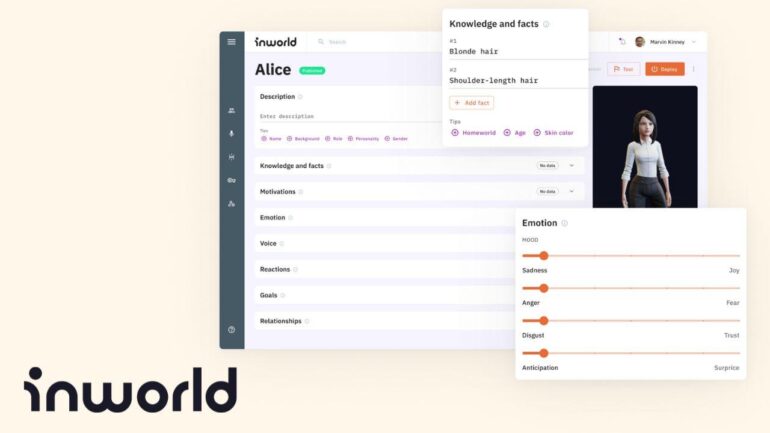TL;DR:
- Inworld, a startup focused on generative AI for dynamic dialogue in games, secures substantial investment.
- The platform utilizes multiple machine learning models to create lifelike NPC interactions in 3D environments.
- NPCs powered by Inworld’s tech can learn, adapt, and initiate actions, enhancing gaming experiences.
- Developers can customize NPCs’ personalities, emotions, and knowledge through natural language descriptions.
- Inworld ensures safety with controls for profanity, bias, and toxicity, while preserving immersion with the “4th Wall” tool.
- Major investors, including Lightspeed Venture Partners and Microsoft’s M12 fund, value Inworld at $500 million.
- The platform’s expansion into marketing, entertainment, and open-source initiatives aims to cater to a broader audience.
Main AI News:
For avid gamers like myself, the potential of generative AI in dynamic dialogue has always been a thrilling prospect. While I don’t advocate replacing human writers, anyone who has delved into extensive RPGs knows how quickly scripted NPC interactions can become monotonous.
Enter Inworld, a startup that is making strides in prototyping AI technology for dynamically generating dialogue. Founded in 2021 by the team behind API.AI, which was later acquired by Google in 2016 and evolved into Dialogflow, Inworld aims to revolutionize the gaming experience. The company claims to leverage “multiple” machine learning models to simulate the vast spectrum of human communication. By integrating its dialog and voice-generation tools with popular game engines, including 3D environments, Inworld endeavors to deliver more lifelike and immersive gaming experiences.
Kylan Gibbs, Inworld’s chief product officer and co-founder alongside Ilya Gelfenbeyn and Michael Ermolenko, expressed his optimism about the potential impact of AI in interactive entertainment. Inworld’s NPCs powered by their innovative tech have the ability to learn and adapt, enabling them to engage players with memories and recall. This means an NPC could remember a player’s interest in soccer or their animosity towards another character, adding an element of unpredictability to the gaming experience. Furthermore, these AI-driven characters can autonomously set goals and perform actions, making game interactions even more captivating.
Developers can create unique personalities for Inworld’s NPCs using natural language descriptions, and they can map each character’s “emotions” to specific goals and custom triggers. To enhance personalization, users can input “personal knowledge” to control the information an NPC should or should not know, such as shared lore, world contexts, and backgrounds. Additionally, Inworld NPCs can be configured to gather player-specific information like names, roles, genders, and other game-specific elements, while also being tailored to act in friendly or hostile ways based on their “relationship fluidity” settings.
Addressing concerns about AI veering off-script, Inworld reassures developers with its safety measures, which include controls for profanity, bias, and toxicity to ensure characters stay true to their brands. The platform allows flexibility concerning various topics, such as profanity, violence, adult themes, alcohol, substance use, politics, and religion, while firmly prohibiting hate speech and content promoting self-harm. Inworld also introduces “4th Wall,” a tool that preserves immersion by restricting NPCs from discussing elements outside of a game’s lore, such as locations, people, social constructs, professions, and time periods.
The groundbreaking potential of Inworld has attracted significant investment, with Lightspeed Venture Partners leading the latest funding round, injecting over $30 million into the company. Notable investors such as Stanford University, Samsung Next, Microsoft’s M12 fund, and Eric Schmidt’s First Spark Ventures also participated, valuing Inworld at an impressive $500 million post-money valuation and bringing the total funds raised to over $100 million.
The company’s track record and growing momentum have piqued the interest of other major players. Disney, as part of the 2022 Disney Accelerator, and Epic, through a grant to integrate with Unreal Engine, have already collaborated with Inworld to create AI-driven NPC experiences. For instance, Inworld partnered with ILM Immersive, Lucasfilm’s storytelling studio, to develop a prototype enabling users to interact with droids. Moreover, various developers have utilized Inworld’s platform to create AI-driven character modifications for games like Skyrim, Stardew Valley, and Grand Theft Auto V.
Not content to solely focus on the gaming realm, Inworld envisions expanding its influence into areas like marketing campaigns, automated customer service agents, and broader entertainment. With its ample funding, the company plans to launch an open-source version of its character creation tool, Character Engine, in the coming months, allowing more hobbyists to access and use their groundbreaking technology.
As competition intensifies in the realm of generative AI for gaming, Inworld faces the challenge of differentiating itself from well-funded rivals like Character.AI, which is also developing tools for dynamic dialogue across various media. Nevertheless, Inworld’s vision goes beyond just games, as it explores diverse opportunities in marketing and entertainment sectors, tapping into a potentially larger addressable market.
Moritz Baier-Lentz of Lightspeed Venture Partners, who is set to join Inworld’s board of directors, commends the company’s unique position in a rapidly shifting landscape. Inworld stands out among the 200-plus investable opportunities at the intersection of gaming and AI due to its exceptional team, product velocity, and significant traction. As the AI-driven gaming revolution unfolds, Ilya, Kylan, Michael, and the rest of the Inworld team are poised to seize an outsized opportunity, ushering in a new era of interactive entertainment.
Conclusion:
Inworld’s success in securing significant investment demonstrates the rising interest in AI-driven interactive entertainment. The platform’s promise to create lifelike NPCs and its application beyond gaming bode well for its market potential. As Inworld continues to innovate and expand its offerings, it is poised to make a significant impact in the generative AI market, catering to both gaming enthusiasts and a wider range of industries.

